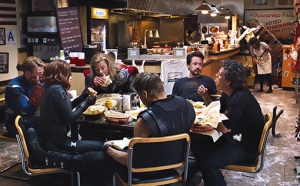 After the climactic battle scene in the movie “The Avengers,” Tony Stark (a.k.a. Ironman) thinks it’s a good idea if they all go out for shawarma. He’s not sure what shawarma is, but he’s heard that it is good.
After the climactic battle scene in the movie “The Avengers,” Tony Stark (a.k.a. Ironman) thinks it’s a good idea if they all go out for shawarma. He’s not sure what shawarma is, but he’s heard that it is good.
Well, I know what shawarma is! I was raised in North Dakota where food was not exactly adventurous. But at the age of eighteen I headed off for college in Minneapolis. I was experimenting with all sorts of new food now that I was on my own. I discovered that bell peppers were not poisonous, and that there were more spices worth using than just salt and pepper. Feeling quite daring, I noticed an interesting-looking restaurant a couple of blocks from the college. It was called “Abdul’s Afandy.” And the very first thing I tried at Abdul’s was a chicken shawarma sandwich.
It was a totally new flavor experience for me. That sandwich was the first food I had ever tasted that I could not compare to something else. It didn’t taste like meatloaf, or pot roast, or scrambled eggs. It tasted like shawarma. And it was great!
I’m told that more and more people are abandoning Christianity because of the bad taste it leaves in their spiritual mouths. Sexual abuse and cover up, misappropriation of money, closed mindedness, willful ignorance of scientific knowledge, and the inconceivable demonization of homosexuality all seem to epitomize Christianity in our day. All the voices and faces of Christianity that the mainstream media seems to show are either the charlatans and their televised circuses or the narrow minded “experts” espousing hatred and intolerance on what used to be news shows. I believe most people don’t know that there is more than one flavor of Christian. They think it is all meatloaf or pot roast. They’ve never had shawarma.
The Urban Abbey celebrates a shawarma kind of Christianity.
- It is not built on dogma or doctrine.
- It is based on Jesus’ teachings that love of God and love of neighbor (and implicitly of self) are intertwined and the beginning and goal of the journey.
- It can be embodied in billions of different ways, just as there are billions of people.
- Its flavor is that of hospitality and peace and deep, unconditional love.
- It is open to the movement and inspiration of the Spirit doing new things, creating new flavor combinations, so to speak.
One of the great challenges for the Urban Abbey and all voices of a different flavor of Christianity is to tell others that we can go get shawarma and that it is great. Our silence simply reinforces the impression that there is only one kind of Christianity and it is all judgmental and angry. In the Christian universe there is indeed meatloaf and pot roast but also shawarma and sushi and more. The Urban Abbey is a full flavor experience.







